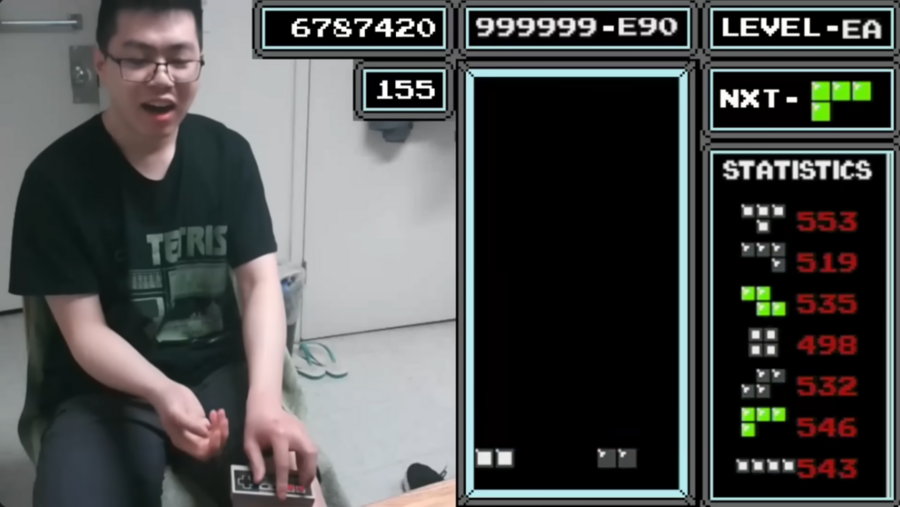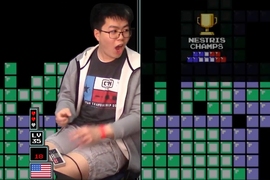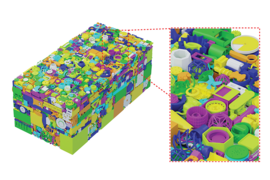Fans of classic “Tetris” have a lot to celebrate at the moment: On Dec. 21, 2023, player Willis Gibson (who plays under the handle BlueScuti) advanced so far into a game of “Tetris” that the game froze: a new achievement in the classic game, which is played on a Nintendo Entertainment System console. Gibson’s win made national headlines and a video of his shocked reaction to the game screen went immediately viral.
But alert readers of MIT News know about another player chasing the “game crash” — MIT junior Justin “Fractal161” Yu, a computer science and engineering major from Dallas, Texas, whose win of the 2023 Classic Tetris World Championships last October made him the top-ranked player in the world.
In a recent interview, Yu revealed a fascinating “space race” behind the scenes of Gibson’s achievement: Not only were Yu and Gibson aware of each other’s attempts on the record, but they were in active competition at the time of the win. Topping it off, Yu revealed that he had successfully equaled Gibson's accomplishment on Jan. 3, becoming only the second person to ever crash “Tetris.” The livestream of Yu’s run has garnered over 600,000 views on YouTube, and an avalanche of congratulations from both well-wishers within the close-knit classic “Tetris” gaming community and casual observers who remember the game from their childhood. We sat down with Yu to hear his take on the competition that pushed both players to the limits of the game.
Q: Congratulations on hitting game crash! How long have you been working on this?
A: I think the real answer is: for five years, since I started playing the game. But after the world championships, I took a day to make a lot of offline attempts on my own, which got me to about 1,100 lines — or, about 70 percent of the way to game crash. After the semester finished and I had free time, I decided to go for this objective. So, I went home and started my very first streamed attempt, and not 10 minutes later I received word that a new player, BlueScuti, had broken a separate world record. I didn’t previously know that he was working on really long games, and he didn’t know that I was, but now we both were. So, we started talking afterwards, and decided, hey, we should make this a competition.
Q: Did anyone else know about this race?
A: This is one of the stories you won’t hear from the conventional news outlets, but we were both, I think, going at 100 percent because there was this threat of another skilled player who could get the achievement before you. I think the all-out press lasted about two days, but there is a point where I briefly took the record for highest score, and then died at about 1,400 lines because there was a level that was so incredibly dark that I felt as if I’d been blinded for a split second. The issue was entirely preventable. My family didn’t have a universal remote controller at home, so I couldn’t turn up my TV’s brightness settings to the maximum. The next day I went to Walmart and bought a universal remote, set up the monitor, and was warming up for my game … and that’s when I heard that BlueScuti was up to a thousand lines. And that’s the game where he got game crash. You can see my reaction in-game. I felt like the race was over before it began — but it was also some of the most intense, concentrated effort either of us have put into the game.
Q: So, this is a long-term pursuit that you’ve both been working toward for a while?
A: Yes, but we also play in many other modes and get better, so when we return to playing long games, we’ve made big strides. The thing about long games is that you are incentivized to play with as few risks as possible. However, now that the pressure is off to be the first person to get game crash, I may want to be the person to try for something different. On my stream, after I cooled down a bit, I gave a massive list of potential achievements — but I think the one which will be the most interesting is going beyond game crash. Both BlueScuti and I used very specific setups that are guaranteed to give us the crash at the same time; but there are situations that are also setups where, theoretically at least, you could get to level 255 and beyond.
Q: How would that happen?
A: The levels are stored in single bytes — so when you add one level beyond its capability, the game does not crash; rather, the counting mechanism for levels fails and the level returns to zero while your score remains as high as it was.
Q: Is this like the Y2K of “Tetris?”
A: Yes; essentially, the game wraps all the way back around to zero. But it’s very difficult, because starting at level 249, the game starts throwing everything at you. Every piece you place may represent a crash unless you go for some really insane movements. But we haven’t even gotten halfway to this point in the first place, so there’s a lot to do in the meantime.
Q: Why do you think all of these achievements are happening now? Do you think that BlueScuti’s game, as well as other milestones, are because of the rolling technique you described in our last chat?
A: It’s rolling; but it’s also the fact that we decided to go for this achievement! I think our community has had several people who are capable of doing this for over a year, but the idea of just playing for 40 minutes straight is not something most players like. So, it was the fact that two people at the same time decided to go for it and we started competing, and we have gotten the most media attention ever — now I think more of our top players will be inspired to try for things.
Q: Do you see the media attention as a positive for the community?
A: I think that remains to be seen. I’m not sure if “This game has finally been beaten” is the best message to new players, because it feels like, “We’ve finished up!” but I’m hoping to be proven wrong on that. There are still lots of other achievements to be chased. For instance, there’s the idea of “the perfect game of 'Tetris.'” So in a normal game, the maximum possible displayable core is 999,999. (Incidentally, there are two scores: 999,999 and a different, true score that goes into the millions. The game can’t display the true score, so streamers like me add it to our videos after the fact so you can see how we’re scoring after the max has been reached.)
People have been able to reach max score for decades, so it became a challenge to do as fast as possible. Tetrises — clearing four lines at once — give you the most score, but no one has ever been able to max out their score getting only Tetrises. It would require both near-flawless play and near-flawless luck to accompany the play. You’d only play on slower levels, but each move has to be perfect. In contrast, when going for long games, you play on faster levels, but you can make several moves which are “good enough.”
Q: BlueScuti is very young, just 13 years old. Is that typical of new players in this field?
A: He is slightly younger than what you’d expect. A lot of the biggest prodigies have been 13 or 14 when they started playing. I am pretty firmly on the older side of people who rank at a high level; it’s been that way for years. Playing consistently and improving technique is an investment of time and effort — it’s staying in shape! But I think the best thing about watching BlueScuti play is that it’s pretty clear he just really likes the game. That’s the true secret to us: You practice because you want to, and you get better because you want to; it doesn’t feel like work. That’s the goal you want to be reaching for. It could be “Tetris,” but it could be something else that you choose. If you find that pursuit, that’s a really good time.








